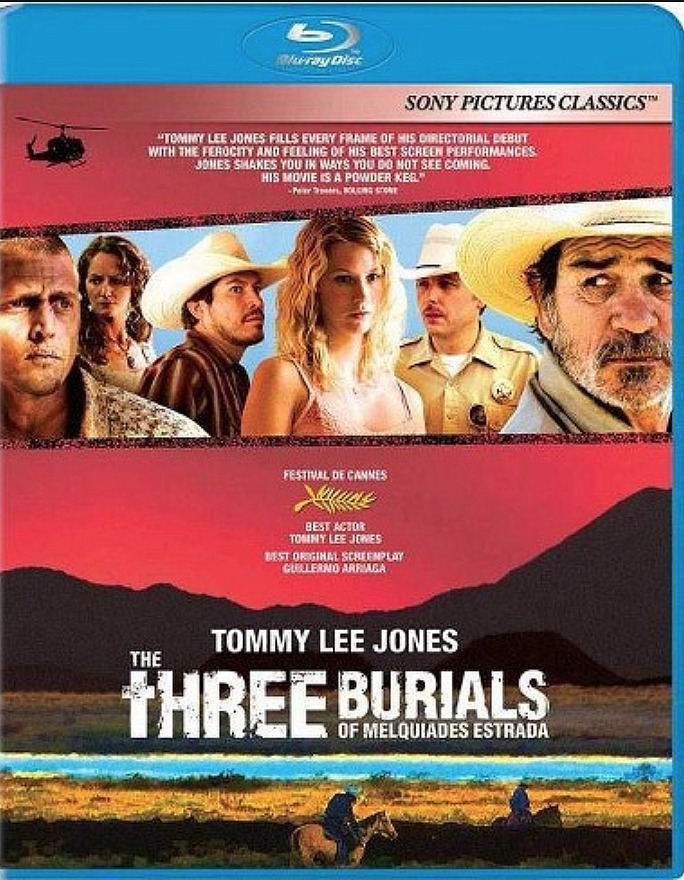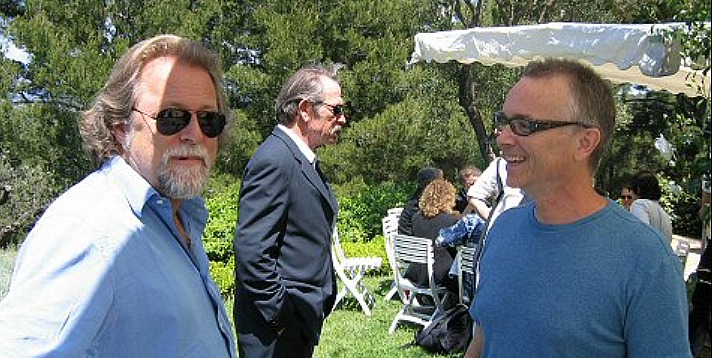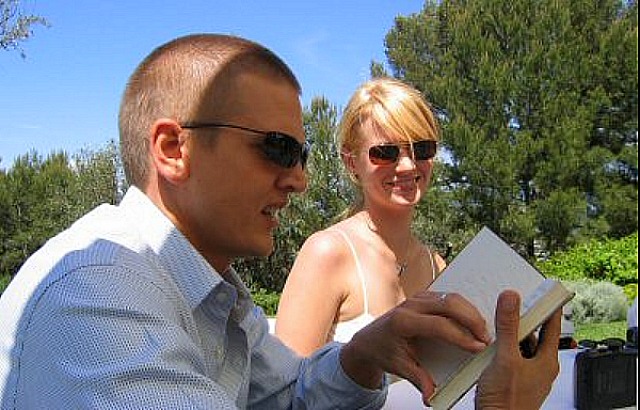15 and 1/4 years ago I caught Tommy Lee Jones‘ The Three Burials of Melquiades Estrada in Cannes. I was an instant admirer. Directed by and starring Jones and based on a script by Guillermo Arriaga, it’s a tautly absorbing, well-crafted morality (i.e., anti-racism) tale. I decided this morning that re-watching it might be a good idea. It’s now on my Amazon watchlist.
Here are some impressions about the film and a press session that the producers staged in the hills above Cannes. Filed on 5.19.05, the piece was called “Respecting a Dead Guy.”
“I’ve pledged not to wade into The Three Burials of Melquiades Estrada until later this evening, but it’s fair to repeat what other journos are saying, which is that it’s highly respectable. Some (like the Toronto Sun‘s Bruce Kirkland) expressed surprise at how smartly composed and compassionate and thematically rich it is. Surprised because you never know what to expect from a first-time-out director. It could have been indulgent or precious or half-baked.
“It’s also fair to report that I attended an American Pavilion interview late Wednesday afternoon between Jones and Roger Ebert. Ebert made it clear he’d had a positive reaction to the film. He also asked if anyone in the audience had seen it, and when I raised my hand he asked me what I thought and I offered a thumbs-up gesture.


The Three Burials of Melquiades Estrada producer Michael Fitzgerald (left), director-producer-star Tommy Lee Jones (center) and Toronto Sun critic-reporter Bruce Kirkland at Thursday’s press gathering at a wonderfully picturesque and soul-soothing villa in the hills above Cannes — 5.19.05, 12:35 pm.

View of Cannes and the Med from EuropaCorp-rented villa.

“The Three Burials of Melquiades Estrada is a modern-day tale set in western Texas and northern Chihuahua, Mexico. It deals with a ranch foreman (Jones), a border patrolman (Barry Pepper) and an illegal immigrant named Melquiades Estrada who works for Jones. The second half is a horseback-journey film about redemption and seeing through prejudices and embedded attitudes.
“It’s a film with a great deal of compassion and soul and a generally humanistic view of things. If you want your literary influences, check out Flannery O’Connor’s work and William Faulkner’s ‘As I Lay Dying.’
“In the press kit, Arriaga says he wanted “to make a study in social contrast between the land that’s south of the Rio Grande river and the land that’s north of it. About what ironies, injustices, glory, beauty and redemption you can find in this area that has its own character…something that cannot be imposed, something that has grown and evolved…something that cannot be controlled.”
“Just before 11 am today myself and a few other journos (Kirkland, Stephen Schaefer, Desson Thomson, Harlan Jacobson, Shari Roman, etc.) were driven in a minivan from the Gray d’Albion hotel near the Croisette into the hills above Cannes, and eventually (the driver got lost) to a beautiful hilltop villa.
“The purpose was to allow for a brief schmooze with Jones, Arriaga, Pepper, young co-star January Jones and producer Michael Fitzgerald (whose other ventures include Colour Me Kubrick and Sean Penn’s The Pledge).
Pepper said that Jones “has a very deep passion for strong visual composition and the poetry of words.” He read some passages from his on-set journal, and on one page he described Jones as “a Southern badass with a ruthless work ethic and a heart the size of the Copper Canyon.”
“He mentioned two things that Jones told him before shooting a couple of scenes — ‘Keep it stupid simple’ and ‘don’t do somethin’, just stand there.’
“Jones was asked to articulate the film’s themes, but he’s not what you’d call a press-junket gabber. Aside from calling it ‘a journey toward redemption,’ he said, ‘You’re invited to read into it anything you deem appropriate…all you want, all you want.’
“Pepper said that Jones read aloud from the book of Ecclesiastes during shooting. Jones was later asked why. ‘Because I like the book,’ he replied. Jones’ philosophy of directing actors, he said, is the same attitude he brings to handling a horse, which is ‘never ask a horse to do what it can’t do.’
“Jones was asked what doesn’t work on the set as far as directing is concerned. ‘Tantrums are not constructive,’ he said. ‘Egotism is not, I think, a good thing.’
“He said he’s long wanted to direct a film of Cormac McCarthy’s ‘Blood Meridian,’ and was asked a few years ago by then-Sony chief John Calley to write an adaptation of it in script form. He delivered it a year later but ‘they said it was too violent,’ he said.
“The session ended after an hour or so, and everyone was driven back to town.
“A wafer-thin and very beautiful dark-haired woman who does interviews for French TV sat next to me in the van on the way back. She was dressed in a sheer white dress and smelled like jasmine and musk.
“I glanced at a printed itinerary she was holding in her hand, and saw that she had three hair-and-makeup appointments set for today — one at breakfast, a second just after lunch and a third before going out this evening.”
